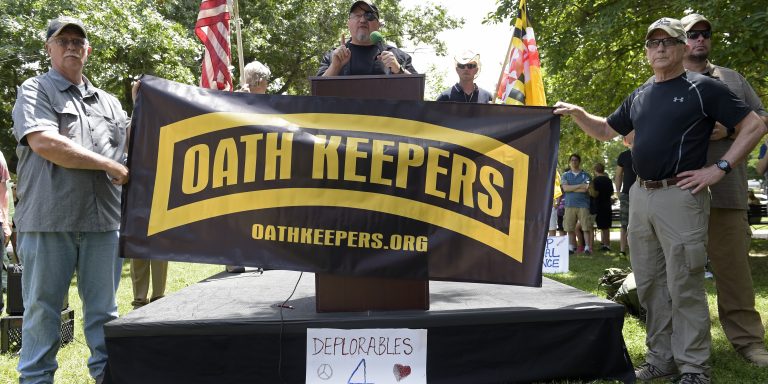INTELBRIEF
October 19, 2020
IntelBrief: Leadership and Organizational Dynamics of the Oath Keepers

Bottom Line Up Front
- The overall reach of the Oath Keepers’ social media presence decreased during the summer as Facebook and Twitter de-platformed their accounts.
- Prior to the ban, the group peddled a range of COVID-19- related conspiracies and disinformation – mimicking QAnon’s online tactics.
- Stewart Rhodes, the Oath Keeper’s leader, may be losing his once ironclad grip over the organization, leading to possible splinter groups.
- To remain relevant to the most hardcore elements of the Oath Keepers, Rhodes could pursue desperate plots to demonstrate his resolve.
With the recent foiled plot to kidnap Michigan’s Governor and Election Day nearing, law enforcement, social media companies, and online extremist researchers are scrutinizing the online and offline activities of militia and anti-government groups. Among the organizations that warrant additional attention are the Oath Keepers, a right-wing militant group that has drawn a skilled-set of members, many with prior military or law enforcement experience. The organization founded in 2009 by Stewart Rhodes is likely one of the larger militia groups in the United States. The organizational cohesion of this group remains unclear and questions have surfaced about Rhodes’ effectiveness as a leader. De-platforming by Facebook in August 2020 and Twitter in September 2020 have slightly decreased access to Oath Keeper content, but the organization’s YouTube Channel, Oath Keepers TV, still has more than 41,000 subscribers and allows the group to remain in touch with followers and potential recruits. The YouTube page also provides a link to the organization’s website and contains a diverse array of videos, to include focus areas on ‘guns and gadgets’ and a series called ‘red-pill politics’ as well as livestream videos detailing the group’s perspectives on issues like gun control and COVID-19.
While the Oath Keepers tout their adherence and oath to the Constitution, the group has glommed onto conspiracies and spread disinformation since the beginning of the COVID-19 pandemic, demonizing public figures like Dr. Anthony Fauci and philanthropist Bill Gates. In doing so, the Oath Keeper social media accounts mimicked rhetoric associated with QAnon – the global far-right conspiracy that global elites are engaged in a Satanic worshipping ring, a conspiracy President Trump refuses to denounce. The timing of the Oath Keepers' vitriol towards these figures - who have advocated scientific and socially responsible approaches to fighting the pandemic – corresponded with various local and state government efforts to shut-down businesses and the associated ‘reopen’ protests that resulted. In April 2020, Oath Keeper social media accounts that were active over Twitter and Facebook, for instance, echoed President Trump’s April 17, 2020, tweet that requested the ‘liberation’ of three states – Michigan, Minnesota, and Virginia.
President Trump’s tweets were suggestive that state government officials were trying to hinder 2nd Amendment rights and livelihoods (by enforcing shutdowns that kept people away from their jobs) of Americans. In their public rhetoric, The Oath Keepers have firmly backed the President’s sentiments. Yet, like other ‘talking-militias,’ or those that typically avoid direct confrontation, the group’s rank-and-file membership may be losing faith in its long-time leader’s willingness to adopting what many feel is becoming its only option—a more direct ‘up-front’ approach to countering perceived government overreach into the lives of American citizens. Rhodes’ recent rhetoric has assumed a more militant tone. Organized street-level activity and willingness to embrace non-2nd Amendment conspiracies should concern U.S. government officials monitoring election and post-election security threats, especially when overlaid with the Wolverine Watchmen’s alleged plans to kidnap and kill Governor Whitmer.
In Rhodes’ ten plus years of leading the Oath Keepers, the organization has been largely ineffective, while it is now apparent that his leadership style has alienated members through a toxic combination of malfeasance and arrogance. This leadership portrait—of a man desperately clinging to relevance—could suggest an organization in flux, and one shifting to more ‘up-front’ behavior that could result in clandestine, seditious activity, including violence. American historian and Polish underground freedom fighter Janusz Zawodny observed that group dynamics often dictate whether a leader is replaced. Rhodes may feel internal pressure to act more forcefully to appease hardliners in his group and if he decides not to act, the group could splinter into several smaller groups, some determined to pursue a far more hardcore approach to militia activity.